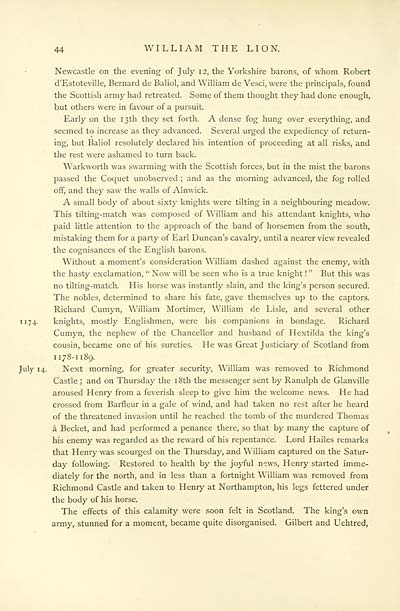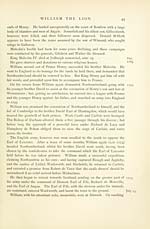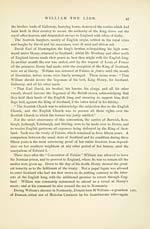Family records of the Bruces and the Cumyns
(56) Page 44
Download files
Complete book:
Individual page:
Thumbnail gallery: Grid view | List view

44 WILLIAM THE LION.
Newcastle on the evening of July 12, the Yorkshire barons, of whom Robert
d'Estoteville, Bernard de Baliol, and William de Vesci, were the principals, found
the Scottish army had retreated. Some of them thought they had done enough,
but others were in favour of a pursuit.
Early on the 13th they set forth. A dense fog hung over everything, and
seemed to increase as they advanced. Several urged the expediency of return-
ing, but Baliol resolutely declared his intention of proceeding at all risks, and
the rest were ashamed to turn back.
Warkworth was swarming with the Scottish forces, but in the mist the barons
passed the Coquet unobserved ; and as the morning advanced, the fog rolled
off, and they saw the walls of Alnwick.
A small body of about sixty knights were tilting in a neighbouring meadow.
This tilting-match was composed of William and his attendant knights, who
paid little attention to the approach of the band of horsemen from the south,
mistaking them for a party of Earl Duncan's cavalry, until a nearer view revealed
the cognisances of the English barons.
Without a moment's consideration William dashed against the enemy, with
the hasty exclamation, " Now will be seen who is a true knight ! " But this was
no tilting-match. His horse was instantly slain, and the king's person secured.
The nobles, determined to share his fate, gave themselves up to the captors.
Richard Cumyn, William Mortimer, William de Lisle, and several other
1 174. knights, mostly Englishmen, were his companions in bondage. Richard
Cumyn, the nephew of the Chancellor and husband of Hextilda the king's
cousin, became one of his sureties. He was Great Justiciary of Scotland from
1178-1189.
July 14. Next morning, for greater security, William was removed to Richmond
Castle ; and on Thursday the 18th the messenger sent by Ranulph de Glanville
aroused Henry from a feverish sleep to give him the welcome news. He had
crossed from Barfleur in a gale of wind, and had taken no rest after he heard
of the threatened invasion until he reached the tomb of the murdered Thomas
a Becket, and had performed a penance there, so that by many the capture of
his enemy was regarded as the reward of his repentance. Lord Hailes remarks
that Henry was scourged on the Thursday, and William captured on the Satur-
day following. Restored to health by the joyful news, Henry started imme-
diately for the north, and in less than a fortnight William was removed from
Richmond Castle and taken to Henry at Northampton, his legs fettered under
the body of his horse.
The effects of this calamity were soon felt in Scotland. The king's own
army, stunned for a moment, became quite disorganised. Gilbert and Uchtred,
Newcastle on the evening of July 12, the Yorkshire barons, of whom Robert
d'Estoteville, Bernard de Baliol, and William de Vesci, were the principals, found
the Scottish army had retreated. Some of them thought they had done enough,
but others were in favour of a pursuit.
Early on the 13th they set forth. A dense fog hung over everything, and
seemed to increase as they advanced. Several urged the expediency of return-
ing, but Baliol resolutely declared his intention of proceeding at all risks, and
the rest were ashamed to turn back.
Warkworth was swarming with the Scottish forces, but in the mist the barons
passed the Coquet unobserved ; and as the morning advanced, the fog rolled
off, and they saw the walls of Alnwick.
A small body of about sixty knights were tilting in a neighbouring meadow.
This tilting-match was composed of William and his attendant knights, who
paid little attention to the approach of the band of horsemen from the south,
mistaking them for a party of Earl Duncan's cavalry, until a nearer view revealed
the cognisances of the English barons.
Without a moment's consideration William dashed against the enemy, with
the hasty exclamation, " Now will be seen who is a true knight ! " But this was
no tilting-match. His horse was instantly slain, and the king's person secured.
The nobles, determined to share his fate, gave themselves up to the captors.
Richard Cumyn, William Mortimer, William de Lisle, and several other
1 174. knights, mostly Englishmen, were his companions in bondage. Richard
Cumyn, the nephew of the Chancellor and husband of Hextilda the king's
cousin, became one of his sureties. He was Great Justiciary of Scotland from
1178-1189.
July 14. Next morning, for greater security, William was removed to Richmond
Castle ; and on Thursday the 18th the messenger sent by Ranulph de Glanville
aroused Henry from a feverish sleep to give him the welcome news. He had
crossed from Barfleur in a gale of wind, and had taken no rest after he heard
of the threatened invasion until he reached the tomb of the murdered Thomas
a Becket, and had performed a penance there, so that by many the capture of
his enemy was regarded as the reward of his repentance. Lord Hailes remarks
that Henry was scourged on the Thursday, and William captured on the Satur-
day following. Restored to health by the joyful news, Henry started imme-
diately for the north, and in less than a fortnight William was removed from
Richmond Castle and taken to Henry at Northampton, his legs fettered under
the body of his horse.
The effects of this calamity were soon felt in Scotland. The king's own
army, stunned for a moment, became quite disorganised. Gilbert and Uchtred,
Set display mode to:
![]() Universal Viewer |
Universal Viewer | ![]() Mirador |
Large image | Transcription
Mirador |
Large image | Transcription
Images and transcriptions on this page, including medium image downloads, may be used under the Creative Commons Attribution 4.0 International Licence unless otherwise stated. ![]()
| Histories of Scottish families > Family records of the Bruces and the Cumyns > (56) Page 44 |
|---|
| Permanent URL | https://digital.nls.uk/95071658 |
|---|
| Description | A selection of almost 400 printed items relating to the history of Scottish families, mostly dating from the 19th and early 20th centuries. Includes memoirs, genealogies and clan histories, with a few produced by emigrant families. The earliest family history goes back to AD 916. |
|---|

